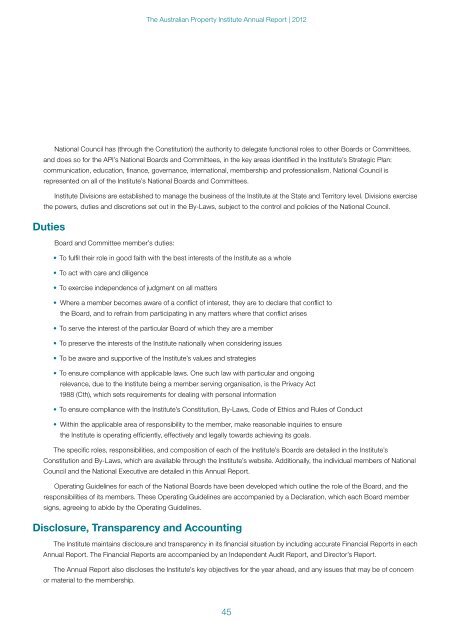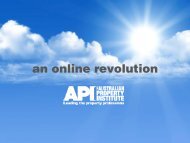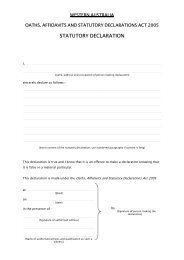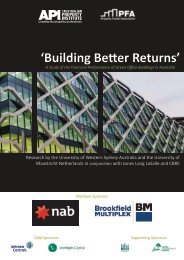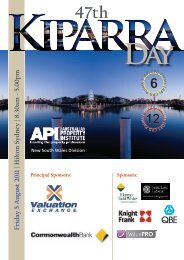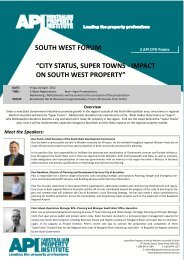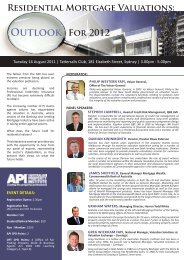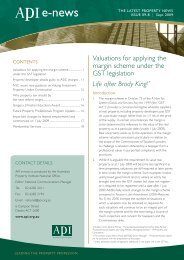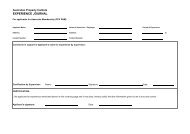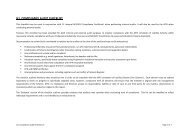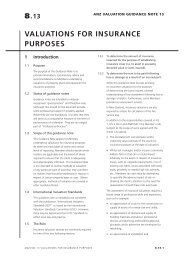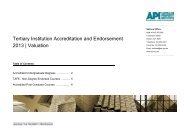Annual Report 2012 - The Australian Property Institute
Annual Report 2012 - The Australian Property Institute
Annual Report 2012 - The Australian Property Institute
You also want an ePaper? Increase the reach of your titles
YUMPU automatically turns print PDFs into web optimized ePapers that Google loves.
<strong>The</strong> <strong>Australian</strong> <strong>Property</strong> <strong>Institute</strong> <strong>Annual</strong> <strong>Report</strong> | <strong>2012</strong>National Council has (through the Constitution) the authority to delegate functional roles to other Boards or Committees,and does so for the API’s National Boards and Committees, in the key areas identified in the <strong>Institute</strong>’s Strategic Plan:communication, education, finance, governance, international, membership and professionalism. National Council isrepresented on all of the <strong>Institute</strong>’s National Boards and Committees.<strong>Institute</strong> Divisions are established to manage the business of the <strong>Institute</strong> at the State and Territory level. Divisions exercisethe powers, duties and discretions set out in the By-Laws, subject to the control and policies of the National Council.DutiesBoard and Committee member’s duties:• To fulfil their role in good faith with the best interests of the <strong>Institute</strong> as a whole• To act with care and diligence• To exercise independence of judgment on all matters• Where a member becomes aware of a conflict of interest, they are to declare that conflict tothe Board, and to refrain from participating in any matters where that conflict arises• To serve the interest of the particular Board of which they are a member• To preserve the interests of the <strong>Institute</strong> nationally when considering issues• To be aware and supportive of the <strong>Institute</strong>’s values and strategies• To ensure compliance with applicable laws. One such law with particular and ongoingrelevance, due to the <strong>Institute</strong> being a member serving organisation, is the Privacy Act1988 (Cth), which sets requirements for dealing with personal information• To ensure compliance with the <strong>Institute</strong>’s Constitution, By-Laws, Code of Ethics and Rules of Conduct• Within the applicable area of responsibility to the member, make reasonable inquiries to ensurethe <strong>Institute</strong> is operating efficiently, effectively and legally towards achieving its goals.<strong>The</strong> specific roles, responsibilities, and composition of each of the <strong>Institute</strong>’s Boards are detailed in the <strong>Institute</strong>’sConstitution and By-Laws, which are available through the <strong>Institute</strong>’s website. Additionally, the individual members of NationalCouncil and the National Executive are detailed in this <strong>Annual</strong> <strong>Report</strong>.Operating Guidelines for each of the National Boards have been developed which outline the role of the Board, and theresponsibilities of its members. <strong>The</strong>se Operating Guidelines are accompanied by a Declaration, which each Board membersigns, agreeing to abide by the Operating Guidelines.Disclosure, Transparency and Accounting<strong>The</strong> <strong>Institute</strong> maintains disclosure and transparency in its financial situation by including accurate Financial <strong>Report</strong>s in each<strong>Annual</strong> <strong>Report</strong>. <strong>The</strong> Financial <strong>Report</strong>s are accompanied by an Independent Audit <strong>Report</strong>, and Director’s <strong>Report</strong>.<strong>The</strong> <strong>Annual</strong> <strong>Report</strong> also discloses the <strong>Institute</strong>’s key objectives for the year ahead, and any issues that may be of concernor material to the membership.45


